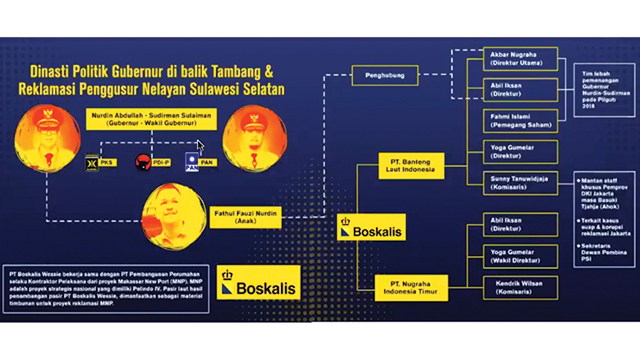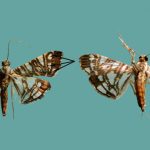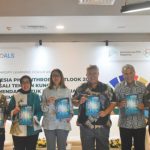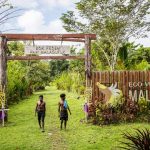Jakarta (Greeners) – Colleagues of South Sulawesi Governor, Nurdin Abdullah, is allegedly involved in the sea sand mining project in Makassar. PT Boskalis International Indonesia has been running the Makassar New Port (MNP) project since February 13, 2020. The sand mining project was conducted in 1,428 hectares in Spermonde Waters, Kodingareng Lompo Island.
Several anglers and environmental activists who protested against these mining activities were arrested on Saturday (12/9/2020). South Sulawesi water and air police (Polairud) immediately apprehend seven anglers, three aspiring journalists, and an environmental activist after showing their disagreement with the project.
According to Merah Johansyah, National Coordinator of the Mining Advocacy Network (Jatam), people from the South Sulawesi Governor’s circle might involve in the apprehension of the protesters.
‘Bee Team’ in the Sea Sand Mining Project
To investigate the issue, Jatam traces several documents from the Directorate General of General Legal Administration, Ministry of Law and Human Rights. They also trace the Environmental Impact Assessment document.
From their investigation, Jatam finds that among twelve businesses that run in Takalar Waters, two of them are PT Banteng Indonesia and PT Nugraha Indonesia Timur.
“People from South Sulawesi Governor’s circle owns these companies,” said Johansyah in an online media briefing “Kolega Gubernur Nurdin Abdullah di Balik Tambang Pasir di Perairan Takalar Sulsel,” or “Governor Nurdin Abdullah’s Colleagues Behind Sea Sand Mining in Takalar Waters South Sulawesi,” Wednesday (17/9).
Also read: On Earth Day, LIPI Optimizes Marine Ecosystem Research
PT Banteng Laut Indonesia is the concession owner where PT Boskalis International Indonesia mines. Its shareholders include Akbar Nugraha as President Director, Sunny Tanuwijaya as Commissioner, Abil Iksan as Director, Yoga Gumelar Wietdhianto, and Fahmi Islami.
Abil Iksan is also listed as a Director of the other company involved in the sea sand mining project, PT Nugraha Indonesia Timur. Along with Iksan, Akbar Nugraha as a Deputy Director, and Kendrik Wisan as a Commissioner in PT Nugraha Indonesia Timur.
“Akbar Nugraha, Abil Iksan, and Fahmi Islami, were part of the ‘Bee Team’. Bee Team is the campaign team to win Nurdin Abdullah and Andi Sudirman Sulaiman. PDI Perjuangan, PKS, and PAN promote the duo in the 2018 election,” adds Johansyah.
Anglers Demand Authorities to Stop Sea Sand Mining Activities
Some sea sand mining companies continue their operation despite the rejection of thousands of local anglers. Johansyah urges the Ministry of Energy and Mineral Resources, the Ministry of Environment and Forestry, and the Ministry of Marine Affairs and Fisheries to freeze the permit of these mining businesses in the Takalar Waters.
“The termination of mining activities, as well as freezing and revoking all mining permits, is in line with the mandate of Law Number 27 of 2007, in conjunction with Law Number 1 of 2014 concerning Management of Coastal Areas and Small Islands. As the law mandated, the use of these areas is not for mining,” Johansyah argues.
Also read: LIPI: Indonesia’s Marine Potential Worth of US$124 Billion
Marine Spatial Planning Policies’ Impact
Commenting on the issue, Secretary-General of the People’s Coalition for Fisheries Justice (KIARA), Susan Herawati, believes that the sand mining that occurred on Kodingareng Island was the impact of marine spatial planning policies.
Furthermore, this law is regulated in South Sulawesi Provincial Regulation Number 2 of 2019 concerning the Zoning Plan for Coastal Areas and Small Islands (RZWP3K) of South Sulawesi Province for 2019-2039.
“To accommodate the national strategic projects, South Sulawesi’s RZWP3K Regional Regulation allocates reclamation for MNP projects and sea sand mining,” she explains.
Susan regrets that Regional Regulation RZWP3K accommodates the needs of the sand mining companies located in Makassar. Moreover, Susan quotes The Indonesian Earthquake Hazard and Sources Map book published in 2017. The book notes that in the Makassar Strait, there are earthquake faults with a type of sea-rising defect.
“In other words, RZWP3K South Sulawesi does not consider the vulnerability of natural disasters in the Makassar Strait. Ironically, the area of sea sand mining has been allocated as much as 9,355.49 hectares,” she adds.
Severe Damage to Marine Biodiversity
According to KIARA Data and Information Center (2020), sea sand mining is massive. If the sea sand mining starts from February to August, PT Boskalis is estimated to have mined sand for approximately 200 days. With the vessel’s transport capacity of 35,500 m³ per day, the company has approximately been mining 21,300,000 m³ of sea sand. These are from the Spermonde Waters, especially those close to Kodingareng Lompo Island.
Commenting on the issue, Ahmad Fakar, Coordinator of the South Sulawesi Save the Coasts Alliance, asserts the biodiversity lost.
“12,300,000 m³ of sea sand is not a small amount. It is destroying the aquatic ecosystems that are home to fish, also the rich marine biodiversity. The long impact of this damage will be severe,” he concludes.
Writer: Dewi Purningsih
Editor: Ixora Devi




















































